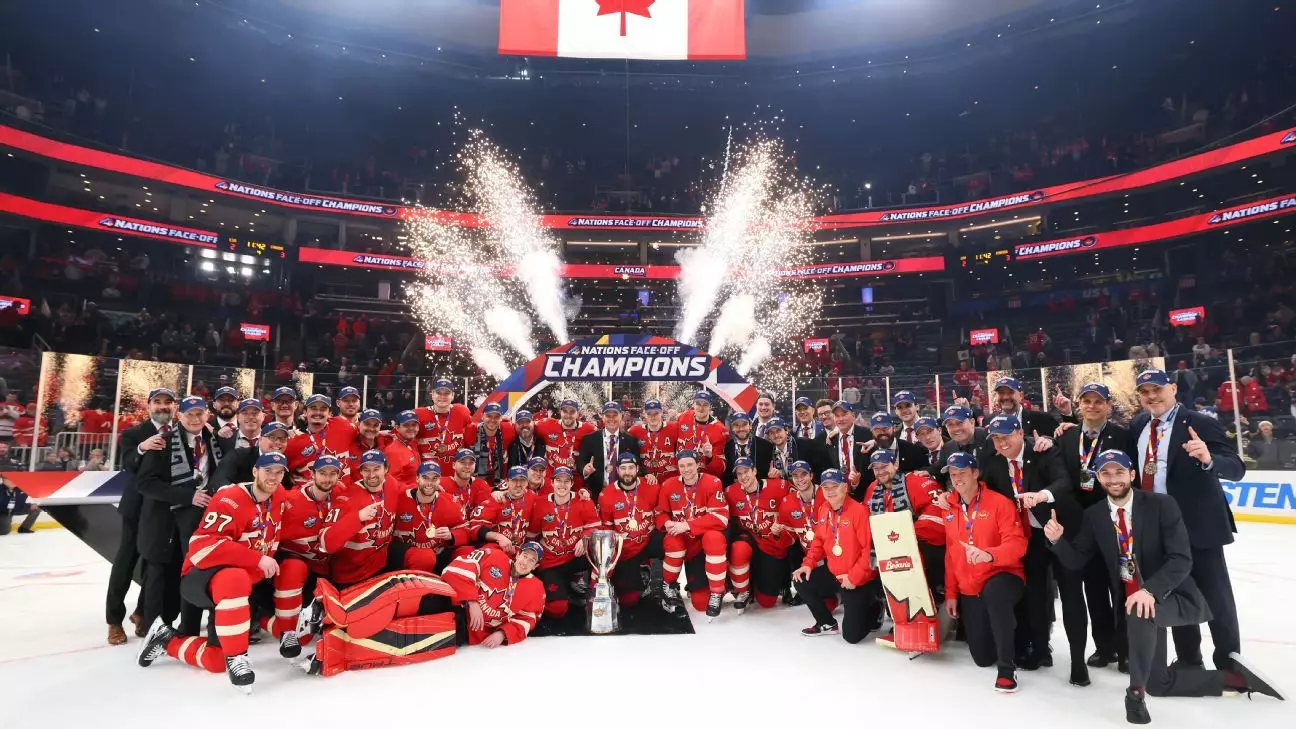The National Hockey League (NHL) is on the brink of transforming its annual all-star showcase, steering away from conventional practices in favor of a fresh, invigorating model. Following the remarkable reception of the recent 4 Nations Face-Off, which took center stage as a competitive alternative to the traditional All-Star Game, the league aims to continue this momentum as the New York Islanders prepare to host the next big event at UBS Arena in February 2026. NHL Commissioner Gary Bettman has expressed a clear intention to elevate the standards of the all-star presentation, indicating that the league is actively pursuing innovative formats that resonate more profoundly with fans and players alike.
Bettman highlighted the significance of setting a higher bar for what an all-star game can entail, a sentiment echoed by many within the league’s management. The bold design of the 4 Nations Face-Off, featuring a round-robin event with top athletes from Canada, the United States, Sweden, and Finland, showcased what is possible when creativity meets elite competition. Canada’s victory, punctuated by an overtime goal from Connor McDavid, not only reignited excitement among fans but also underscored the potential of international competition in growing the sport’s appeal.
International Influence on NHL Strategy
The overwhelmingly positive reception of the 4 Nations event has led the league to contemplate its role on the international stage more seriously. Following a hiatus from Olympic participation in 2018 and 2022 due to various complications including the COVID-19 pandemic, the NHL is reportedly negotiating with the International Ice Hockey Federation (IIHF) regarding the participation of NHL players in the 2026 Milano-Cortina Olympic Games. This signals a renewed commitment to integrating international play within the league’s calendar, which could provide enhanced exposure and fervor for the sport globally.
These developments aren’t merely about scheduling; they represent a significant shift in the NHL’s approach to marketing itself. Engaging fans through the thrill of international competition could reinvigorate the all-star experience, making it not just an exhibition but an event filled with passion and national pride. Fans are eager to see the league’s stars compete in a context that truly matters, and a strategy centered around international tournaments may cater to this desire for deeper engagement.
Challenges Ahead: Negotiating the Future
As the NHL looks ahead to these revolutionary changes, it also faces pressing challenges that demand attention. Collective bargaining negotiations with the players’ association loom large, particularly given that the current CBA is set to expire in September 2026. Bettman has expressed optimism regarding these discussions, but the reality of labor negotiations carries an inherent unpredictability that could impact not just the league’s operational stability but also its future planning.
While the anticipation surrounding new all-star formats is palpable, any significant alterations will need the backing of players while maintaining fan engagement. Bettman has hinted that various factors could influence these discussions, from logistics to potential reforms regarding junior and college hockey eligibility. The interest in redefining how young athletes interact with the league could usher in a new era of development, but whether these discussions will lead to substantive reform remains uncertain.
Innovating While Preserving Tradition
While the NHL is eager to innovate, it is equally critical of its own steadfast traditions, particularly regarding the playoff format. Bettman is dismissive of the need for drastic changes in this area, advocating for the current structure that has garnered praise during the regular season. “What could be more compelling and exciting?” he asked, highlighting the inherent drama and unpredictability of hockey playoffs.
As the league embraces new paradigms, there remains a delicate balancing act between fresh experiences and the cherished traditions that have defined hockey for generations. The existing playoff format has proven to be successful in generating intense fan engagement and competition, making any attempts to alter it a contentious topic among stakeholders.
A New Era of Engagement
In parallel to the reimagining of the all-star experience, the NHL is also set to embark on a new decentralized draft model in 2025. The departure from a centralized location for team representatives reflects a broader trend in sports towards flexibility and accessibility. By allowing teams to connect with prospects from their home cities, the NHL is adapting to modern realities, which may ultimately boost engagement for fans who may not traditionally have access to these events.
However, again, the league’s approach will be communally decided upon, emphasizing the importance of feedback from teams about their experiences and preferences. This reflects a conscious effort to evolve not just for the sake of change but to ensure that whatever direction the NHL takes is in alignment with the desires of its member clubs.
Ultimately, the NHL stands at a pivotal juncture that could lead to a redefined relationship with its fans and players alike. With a commitment to innovation while respecting the foundation of the sport, the league is poised to craft a compelling narrative that resonates long after the lights dim on the all-star stage.


Leave a Reply